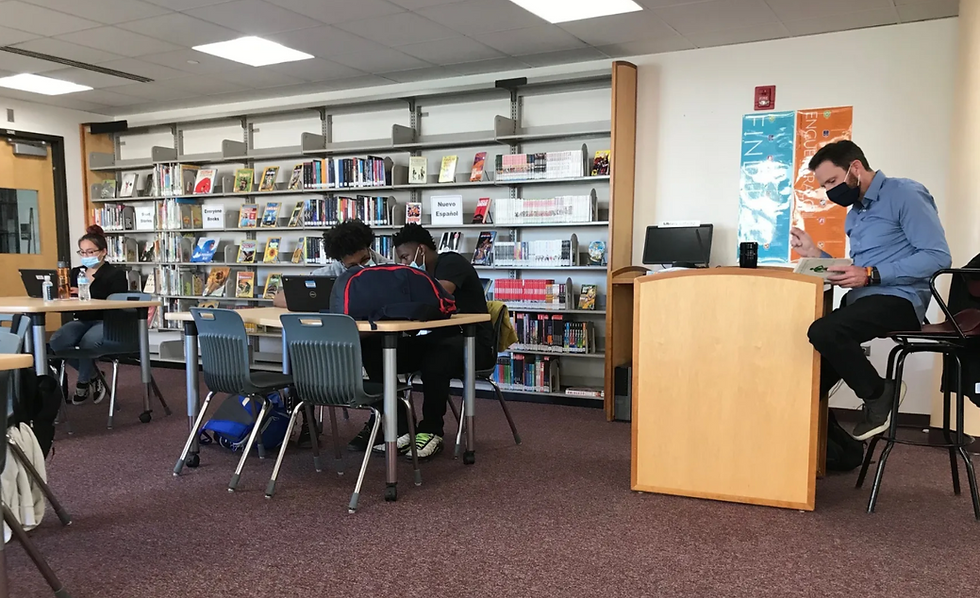
West Early College students take a personal finance class taught by teacher Daniel Walter, right, in the West high school library in Denver.Melanie Asmar / Chalkbeat
On a recent Thursday, Denver teacher Daniel Walter started a lesson on supply and demand with a question about legendary New York Yankees player Alex Rodriguez.
“If A-Rod’s skills are unique enough to get him paid $275 million, what do we know about the supply of great baseball players? High? Low? Somewhere in the middle?” Walter asked.
Low, said his students. Walter then made a connection to the students’ own lives: When you’re considering what type of career you want, he said, investing in your education to learn skills that are scarce — like being able to hit a baseball at 100 miles per hour or, more realistically, knowing how to drill cavities or fix leaky pipes — will net you a higher salary.
Walter teaches at West Early College high school, which is offering a personal finance class that some educators and alumni hope will become a districtwide requirement. The aim is to provide students with real-life knowledge on topics like taxes, credit scores, and loans.
Students said they appreciate the practical lessons.
“I took this class because I feel like when I’m in there learning, it’s giving me the keys to be successful,” said Isaiah Phorson, a West junior. “A lot of high school students are lost when they get out of high school. They don’t know money management.”
This class, he said, “puts you a step ahead in the economic battle.”
Colorado school districts are not required to offer classes in personal finance or financial literacy, though a 2004 state law strongly encourages it. A bill up for debate in the legislature this year, House Bill 1200, would add several topics to the state’s suggested financial literacy curriculum, including how to pay for college and manage student loan debt.
But a group of recent Denver Public Schools alumni is pushing Colorado’s largest school district to go beyond the state recommendations and make financial literacy classes a graduation requirement. About a quarter of Colorado’s 178 school districts already do, according to the Colorado Department of Education. In the past year, several districts, including Adams 14 and Aurora, have added or are planning new personal finance classes.
Denver Public Schools said in a statement that the district is exploring making financial literacy a graduation requirement. The district’s academics team said it is grateful for its collaboration with alumni and appreciate “their advocacy in making this a priority.”
Liloni S. Ramos, who graduated from Denver Public Schools in 2011, said she didn’t get any personal finance lessons in high school. It wasn’t until she took a workshop offered through a scholarship foundation that she learned about topics like budgeting.
“Growing up, budgeting wasn’t a thing because we barely had enough money to make ends meet,” Ramos said. “This conversation, we’ve been kept out of all too often.”
At West Early College, the impetus to offer a personal finance class grew out of a districtwide effort to improve education for Black students. Each Denver school was required to write a Black Excellence Plan this year. When West asked families what improvements they wanted the school to make and what courses it should offer, financial literacy was among the most requested, said Principal Mia Martinez Lopez.
Walter was already teaching an economics class that briefly touched on personal finance, and he’d seen how powerful those lessons were to his students.
“Their ears perked up that week,” he said.
So with the backing of school leaders, Walter designed a personal finance class. About 60 students are enrolled this quarter, with some students learning in person and others joining the class virtually from home. The class starts in the 1500s with the birth of modern-day credit. Students learn about the stock market, credit scores, interest, loans, and insurance.
Denver Public Schools alumni have been meeting with West leadership to give input on the course. The alumni are part of Ednium, a new group of graduates from ages 17 to 30, most of whom are people of color. Kai Suematsu, who graduated from Denver Public Schools in 2018, said helping to design the curriculum feels like a concrete step.
“I’m only 20 years old but I can look at it and say, ‘What would I want from a high school perspective?’” said Suematsu, who took a similar class on wealth management when he was in high school. “I can say, ‘This would have really helped.’”
West junior Jordan Johnson said he thinks the class should be required for all students. He is not currently enrolled but plans to sign up when it’s offered again.
“Some kids have the blueprint at home where their parents teach them about financial literacy,” Johnson said. “For a lot of people that’s not the case. ... Those are the tools you’re going to need to survive to get to retirement and take care of your family.”
Johnson was sitting in on Walter’s class the day he taught about supply and demand, human capital, and the importance of investing in yourself to acquire the education and training needed to be financially successful. Walter asked the students to write a quote summarizing that idea.
One student who was participating virtually turned in pure poetry. Walter asked her to read her quote twice so her classmates could hear it over the tinny computer speakers.
“Every moment of one’s existence,” she read, “one is growing into more or retreating into less.”
-1.png?width=1150&height=352&name=Ednium%20Email%20(2)-1.png)


Comments